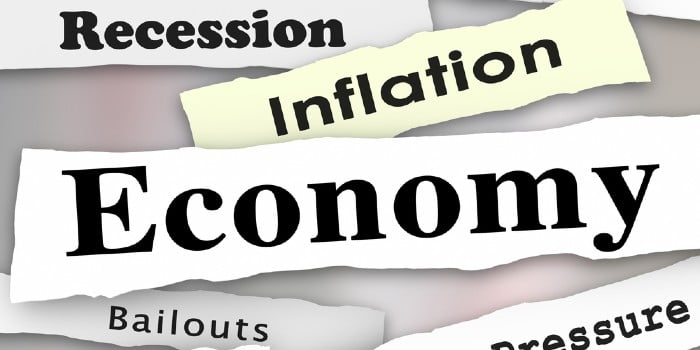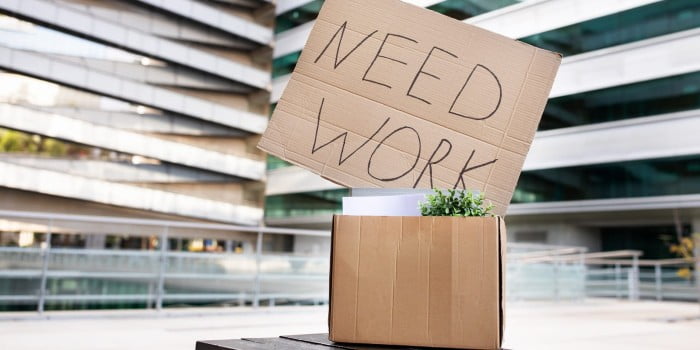21 February 2023 – New data shows that the gross domestic product (GDP) stagnated in the last quarter of 2022. With that the UK avoids a recession narrowly.
A recession is defined as two consecutive quarters of negative growth. And while the UK economy didn’t grow in the final three months of last year, it didn’t shrink either, according to new figures released by the Office for National Statistics (ONS).
This means that the UK avoids a recession by the slightest of margins. However, many experts and business insiders say that this is no reason to celebrate.
The International Moneatry Fund (IMF) and the Bank of England (BoE) both forecast the UK economy to contract this year. So there is a bumpy ride ahead for small UK businesses.
GDP Fell By 0.5% In December 2022
After slight growth in October and November, newly released figures by the ONS have shown that the UK economy has shrunk by 0.5% in December last year.
This is evidence that the cost-of-living crisis is biting. Many people felt compelled to reduce their spending during a time when many businesses expect a sales boost.
In particular, the 0.5% fall in GDP in December is a red flag showing the economy stalled at the end of 2022, just when small firms were hoping for a traditional festive boost.
Tina McKenzie, Policy Chair at the Federation of Small Businesses
According to the Federation of Small Businesses‘ Small Business Index, business confidence plummeted in the last three months of 2022 to -46 points. While slightly better than during the dark days of the second national lockdown at the end of 2020, it is much lower than during the Omicron lockdown.
But reduced spending due to the high cost of living is only one reason for the contraction in December.
Experts believe that strikes, a reduction in doctor’s appointments and operations and the temporarily halt of the Premier League during the World Cup have also contributed to the fall in GDP in that month.
And although the UK avoids a recession for now, the BoE is still expecting the UK economy to shrink this year. However, the Bank has upgraded its forecast and is now only predicting a 0.5% contraction, rather than the 1.5% forecast in November.
The expected recession is predicted to be shallow though and less bad than the one we experienced after the 2008 financial crisis. But that doesn’t mean that this year will not be challenging for small businesses.
Tax And Energy Price Hike Could Force Many SMEs To Close
From April 2023, costs are set to rise again for businesses, with tax increases and the help with energy bills being reduced.
The increase in corporation tax will take effect this April. Corporation tax will increase from 19% to 25% for companies with an annual profit of more than £250,000.
Companies with a profit of £50,000 or below will continue to pay 19%. Firms that have a profit above this but below the higher threshold will pay 25% with a reduction of marginal relief.
It is estimated that this 31.58% tax increase will cost UK businesses £18 billion per year by 2025/26. The tax hike has an especially challenging impact on small and medium-sized enterprises, who are managed by business owners.
Because they tend to use their profits to sustain themselves and their families, they won’t have money left over to grow their businesses.
With many businesses already struggling, the tax rise could push some over the edge, and we could see many business closures.
At the same time, the government energy bill support scheme will be reduced, meaning energy bills for millions of businesses will rise from April.
According to credit score company Experian, one in three businesses in the UK might struggle with costs once the current support scheme ends.
Experian analysed data from 1.2 million small businesses, which suggests that around 30% of them will be at “heightened risk” once the support is reduced.
With the current support in place, the credit score company estimates that 13% of small businesses are at “heightened risk”. This sharp rise in small firms at risk after the support is slashed is very concerning, according to Small Business Commissioner Liz Barclay.
She calls on bigger businesses to pay their small suppliers faster, highlighting a longstanding issue with late payments.
These figures are very worrying. An added threat to the viability of small businesses is that many are struggling to get paid quickly by their bigger customers. If bigger firms are holding onto cash in case they need it for business critical expenditure, small suppliers can struggle to manage their cashflow and pay their energy and other bills while waiting. If energy bills go up again that could break the business. We need bigger customers to pay smaller suppliers as a priority to give them a fighting chance of survival.
Liz Barclay, Small Business Commissioner
The UK might have narrowly avoided a recession for now, but the coming months will be a big challenge for small businesses.






